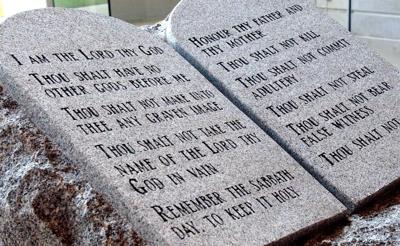
A federal appeals court will hear arguments Louisiana and Texas cases regarding the display of the Ten Commandments in schools.
The U.S. Fifth Circuit Court of Appeals will hear the cases in January. All 17 active judges on the court will review both cases.
In June, a three-judge Fifth Circuit panel upheld an injunction blocking the Louisiana law signed last year by Gov. Jeff Landry making Louisiana the first state to require the posting of the Ten Commandments in all public schools and colleges.
“I’m glad to see the Fifth Circuit is taking this en banc,” Louisiana Attorney General Liz Murrill said. “Looking forward to those arguments.”
First Liberty Institute says Louisiana’s law is constitutional and “a perfect example of what religious liberty in America is all about. It embodies the best of our nation’s history and traditions.”
“Putting this historic document on schoolhouse walls is a great way to remind students of the foundations of American and Louisiana law,” said Matt Krause, an independent legal advisor to First Liberty.
Murrill previously explained the history of the Ten Commandments in public schools, saying they were a prominent part of American education for almost three centuries.
“Around the year 1688, The New England Primer became the first published American textbook and was the equivalent of a first-grade reader,” she said. “The New England Primer was used in public schools throughout the United States for more than 150 years to teach Americans to read and contained more than 40 questions about the Ten Commandments.
“The Ten Commandments were also included in public school textbooks published by educator William McGuffey, a noted university president and professor. A version of his famous McGuffey Readers was written in the early 1800s and became one of the most popular textbooks in the history of American education, selling more than 100-million copies. Copies of the McGuffey Readers are still available today.”
In the Texas case, a federal judge in August found that Ten Commandments law unconstitutional and temporarily blocked it from taking effect, saying the law favors Christianity over other faiths and is not neutral with respect to religion and is likely to interfere with families’ “exercise of their sincere religious or nonreligious beliefs in substantial ways.”
“There are ways in which students could be taught any relevant history of the Ten Commandments without the state selecting an official version of scripture, approving it in state law, and then displaying it in every classroom on a permanent basis,” U.S. District Judge Fred Biery wrote in his opinion, adding that the law “crosses the line from exposure to coercion.”
Texas appealed the ruling, sending the case to the Fifth Circuit. Texas Attorney General Ken Paxton asked the court to take up Texas’ and Louisiana’s appeals together, which it granted in late October.
“The Ten Commandments are a cornerstone of American law, and that fact simply cannot be erased by radical, anti-American groups trying to ignore our moral heritage,” Paxton said. “There is no legal reason to stop Texas from honoring a core ethical foundation of our law, especially not a bogus claim about the ‘separation of church and state,’ which is a phrase found nowhere in the Constitution.”






